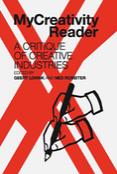downtowns economics ecological networks cartography city-regions knowledge social housing immigration urban market periodic news giornata di studi inu representation ricerca rural areas città storica climate change agriculture urban form premio tesi di laurea job urban design competition planning premio letteratura urbanistica parks
My Creativity Reader: A Critique of Creative Industries
edited by Geert Lovink and Ned Rossiter
The MyCreativity Reader is a collection of critical research into the creative industries. The material develops out of the MyCreativity Convention on International Creative Industries Research held in Amsterdam, November 2006. This two-day conference sought to bring the trends and tendencies around the creative industries into critical question. The “creative industries” concept was initiated by the UK Blair government in 1997 to revitalise de-industrialised urban zones. Gathering momentum after being celebrated in Richard Florida’s best-seller The Creative Class (2002), the concept mobilised around the world as the zeitgeist of creative entrepreneurs and policy-makers. Despite the euphoria surrounding the creative industries, there has been very little critical research that pays attention to local and national and variations, working conditions, the impact of restrictive intellectual property regimes and questions of economic sustainability. The reader presents academic research alongside activist reports that aim to dismantle the buzz-machine.
"We are pleased to present the MyCreativity Reader on international creative industries research. Our interest in MyCreativity has been to assemble a range of expertise and experiences that signal the diversity of creative industries.
It’s been clear to us that - within policy and academic circles at least - creative industries operate as a meme that mobilises expectations. There are contours and forces that guide the creative industries meme in some directions, and not others.
The MyCreativity project intends to play an active part in shaping critical trajectories in the fields by introducing overlooked aspects to creative practice and research. MyCreativity seeks to articulate creative industries as ‘concrete research’ (Tronti) (...).
A universal definition of creative industries does exist within this realm: creative industries consists of ‘the generation and exploitation of intellectual property’. In all seriousness, how many creative practitioners would call themselves producers, let alone financial beneficiaries, of intellectual property?
We must redefine creative industries outside of IP generation. There needs to be a balance between alternative business models and the freedom to commit senseless acts of creativity. The tension between these two constituent realities is what needs to be investigated."
Extract from: Proposal for Creative Research. Introduction to MyCreative Reader, (pp.11-14), Geert Lovink and Ned Rossiter, in MyCreativity Reader, Institute of Network CulturesAmsterdam, 2007
CONTENTS
• Proposal for Creative Research: lntroduction to the My Creative Reader
Geert Lovink and Ned Rossiter
• Nice Work if You Can Get it: The Mercurial Career of Creative lndustries
Policy
Andrew Ross
• Can Natural Luddites Make Things Explode or Travel Faster?
Toby Miller
• Unpredictable Outcomes: A Reflection After Some Years of Debates on Creativity and Creative Industries
Marion von Osten
• Creative Labour as a Basis for a critique of Creative Industries Policy
David Hesmondhalgh
• ICW – Immaterial Civil War: Prototypes of Conflict within Cognitive Capitalism
Matteo Pasquinelli
• Out-Cooperating the Empire?
Geert Lovink and Christoph Spehr
• Re-imagining Chinese Creativity: The Rise of a Super-Sign
Michael Keane
• From Boston to Berlin. Creativity and Digital Media lndustries in the Celtic Tiger
Aphra Kerr
• Wrong in the Right Way? Creative Class Theory and City Economic Performance in the UK
Max Nathan
• The Creative Industries in Austria: The glories of the Past vs. the Uncertainties of the present
Elisabeth Mayerhofer and Monika Mokre
• Creativity is Not About Industry
Annelys de Vet
• The Murder of Creativity in Rotterdam: From Total Creative Environments to Gentripunctual lnjections
BAVO (Gideon Boie and Matthias Pauwels)
• Back to the Future of the Creative City: An Archaeological Approach to Amsterdam’s Creative Redevelopment
Merijn Oudenampsen
• Disconnecting the Dots of the Research Triangle: Corporatisation, Flexibilisation, and Militarisation in the Creative Industries
Brian Holmes
• What if We Would Not have a Copyright? New Business Models for Cultural Entrepreneurs
Joost Smiers
• Craft, Context and Method. The Creative Industries and Alternative Models
Danny Butt
• Strange
Annelys de Vet
• The Pink Rebellion of Copenhagen: Danish Youth Revolt and the Radicalisation of the European Creative Underclass
Alex Foti
• Organic Intellectual Work. Irterview with Andrew Ross
Geert Lovink and Andrew Ross
Appendices
Program of MyCreativity conference
Summary of the ‘Art & Creative Industries’ Debite: MyCreativity mailing list
Wikipedia entry of Creatività Industries
Sebastian Olma: On the Creativity of the Creative Industries. Some
List of Contributors
ABOUT THE EDITOR:
Geert Lovink (NL/AUS), media theorist, critic and author of Dark Fiber, Uncanny Networks, My First Recession and The Principle of Notworking.He is a member of the Adilkno collective (Cracking the Movement, The Media Archive) and co-founder of Internet projects such as The Digital City, Nettime, Fibreculture and Incommunicado. He is founder and director of the Institute of Network Cultures which is part of the Interactive Media School at Amsterdam Polytechnic (HvA) and associate professor at the Media & Culture department, University of Amsterdam. In 2005-2006 he was a fellow at the Berlin Institute for Advanced Study where he finished his third volume on critical Internet culture, Zero Comments (Routledge, 2007).
Ned Rossiter is a Senior Lecturer in Media Studies (Digital Media), Centre for Media Research, University of Ulster, Northern Ireland and an Adjunct Research Fellow, Centre for Cultural Research, University of Western Sydney, Australia. He is the author of Organized Networks: Media Theory, Creative Labour, New Institutions (2006). In 2008 he will leave Ulster to pursue freelance research, http://www.orgnets.net
Reviews:
Related articles:




Planum
The Journal of Urbanism
ISSN 1723-0993
owned by
Istituto Nazionale di Urbanistica
published by
Planum Association
ISSN 1723-0993 | Registered at Court of Rome 4/12/2001, num. 514/2001
Web site realized by ChannelWeb & Planum Association | Powered by BEdita 3


